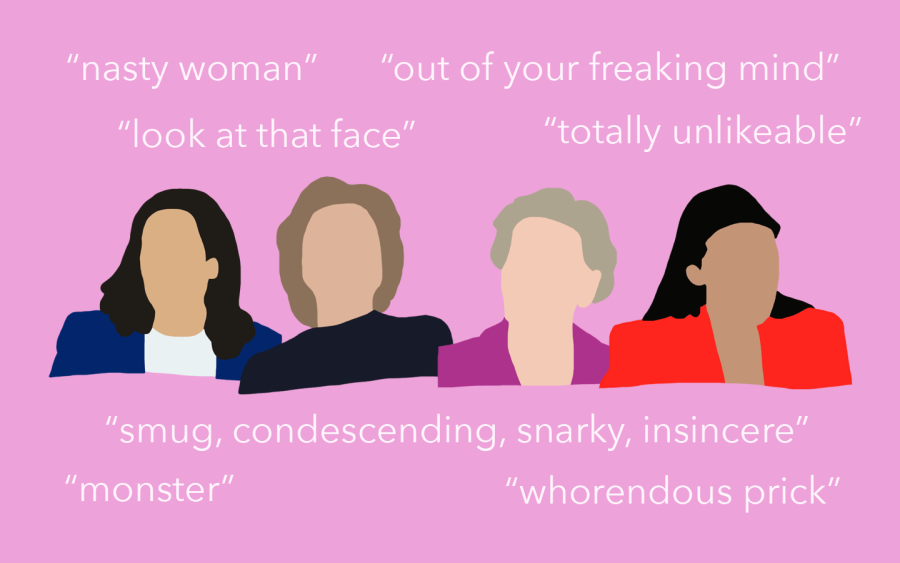The unwritten rules of politics for women
Graphic illustration by Alara Dasdan
Stylized portraits of Kamala Harris, Hillary Clinton, Elizabeth Warren and Alexandria Ocasio-Cortez are centered on a pink background. Negative quotes from political opponents surround them.
November 4, 2020
Social media was in an uproar over the vice presidential debate between Senator Kamala Harris and Vice President Mike Pence. To Republicans, Pence’s uncompromising mettle showed his authority. To Democrats, however, Pence’s repeated interruptions highlighted the sexism and double standards that women in politics still face.
For many women, this was nothing new. Women are expected to follow strict social guidelines and are penalized if they fail to adhere to these rules. They are labelled as “aggressive” if they are assertive but ignored if they aren’t. They are bashed for their physical appearance in a job where beauty standards should be the last priority, and they are attacked with gendered, often sexualized insults that their male counterparts are never faced with. Women of color also face the additional roadblock of race along with gender. Although the power dynamic seen in the debate has been a recurring theme in history, some were hopeful that Harris’s historic position as the first woman of color as vice presidential candidate will spark change.
“If Kamala Harris becomes vice president, that could make a crack in the proverbial ‘glass ceiling,’” U.S. Government teacher David Pugh said.
This debate is evidence that white men do not have to follow the rules.
While women have to win while following them.
— Glennon Doyle (@GlennonDoyle) October 8, 2020
During the debate, moderator Susan Page and Harris were both dismissed and spoken over by Pence, who interrupted Harris 10 times as opposed to her five. Page noted that this interruption mirrors the 2016 election’s vice presidential debate, in which Pence spoke over the female moderator. Pence patronized Harris and trivialized her arguments, leading many to point out his “mansplaining” to her. While on the topic of law enforcement, Pence cut Page off multiple times and accused Harris of being a poor prosecutor during her time as District Attorney of San Francisco. While doing so, he explained topics she stated she was well aware of, such as for-profit college cases she has worked on before. Her response to his patronization was that she would “not sit here and be lectured by the Vice President on what it means to enforce the laws of our country,” and that she was the only one on the stage to have prosecuted the cases he was referencing.
“The President has made clear his disdain for strong women who take a stand against him, such as Nancy Pelosi, Alexandria Ocasio-Cortez, as well as female journalists and interviewers,” Pugh said. “The childish and vitriolic name calling is a new low in politics, especially when compared to a president such as Ronald Reagan, who made a point of never personally insulting a political opponent.”
After the debate, however, conservative pundits described Pence’s performance as level-headed; National Review senior political correspondent Jim Geraghty described his approach as “plainspoken Midwestern common sense.” However, with Harris, the reaction was far colder. Instead of criticizing her policies, the commentary WAS far more personal, like conservative radio host Buck Sexton criticizing her for lacking “warmth” and Free Beacon contributor Noah Pollak saying she was “smug, condescending, snarky, insincere.” These descriptions bear a strong similarity to the “cold female boss” stereotype in popular culture that paints women in power as unkind, domineering and backstabbing.
“Though there aren’t specific laws meant to affirm misogyny and racial discrimination, both issues are still very present in the government in a systemic way,” sophomore Riya Abiram said. “When looking at Senate and House of Representatives seats, for example, women make up less than 30% of spots available.”
As election campaigning progressed, Trump repeatedly called Harris “nasty,” his trademark label for female political opponents such as Hillary Clinton and Elizabeth Warren. He targeted the perceived attitudes of female politicians rather than criticizing policies he didn’t agree with. Along with setting a misogynistic precedent for his supporters, his words portray Harris, Warren, Clinton and other female politicians as petty and incapable of leading in the positions they were campaigning for. It reaffirmed the misconception that women are too emotional to be in power.
In addition to comments on her gender, the right wing also targeted Harris’s ethnicity. Trump promoted “birther” conspiracy theories about her, similar to claims that Barack Obama was not born in America and thus not fit to serve in office. She was labelled as “angry.” Tucker Carlson, the Fox News host, said that she will “bulldoze” Biden. This ties into another historical stereotype of the “angry black woman.” In this trope, a black woman is portrayed as aggressive, commanding and spiteful, which both antagonizes the woman and emasculates the man. Through this, Harris’s identity was weaponized to discredit both her and Biden.
Even with a more modern political climate, Hillary Clinton was famously called a “nasty woman,” and Michelle Obama has been likened to the “angry black woman” stereotype. Similar to conservative claims of Kamala planning to manipulate Biden like a “puppet show,” Nancy Pelosi has been likened to a puppeteer in Republican media. AOC addressed Rep. Ted Yoho’s insults toward her, saying how the U.S. has “a culture of a lack of impunity, of acceptance of violence and violent language against women, an entire structure of power that supports that.”
Unfortunately, this pattern of misogyny is nothing new. In the 1920s, Jeanette Rankin was the first woman elected to Congress. She was heavily criticized and lost reelection for voting against World War I, despite 49 congressmen also taking the same stance. Madeleine Albright, the first female secretary of state, said she was treated like a “mere female civilian” in meetings. Carol Bellamy, president of the New York City Council, felt that they were expected to “give advice only if it’s supportive.”
The recent vice presidential debate once again pushed conversation on America’s systemic misogyny and racism into mainstream media. With it comes a more widely heard call for change and subsequent pushback. If these calls are ignored by the right wing, this situation can and will most likely happen again.
“I think this will happen again, because the government hasn’t done anything to prevent such an incident from happening again,” Abiram said. “Many men in Congress have gotten away with saying whatever they wanted as they have had no punishment for their actions.”




























































